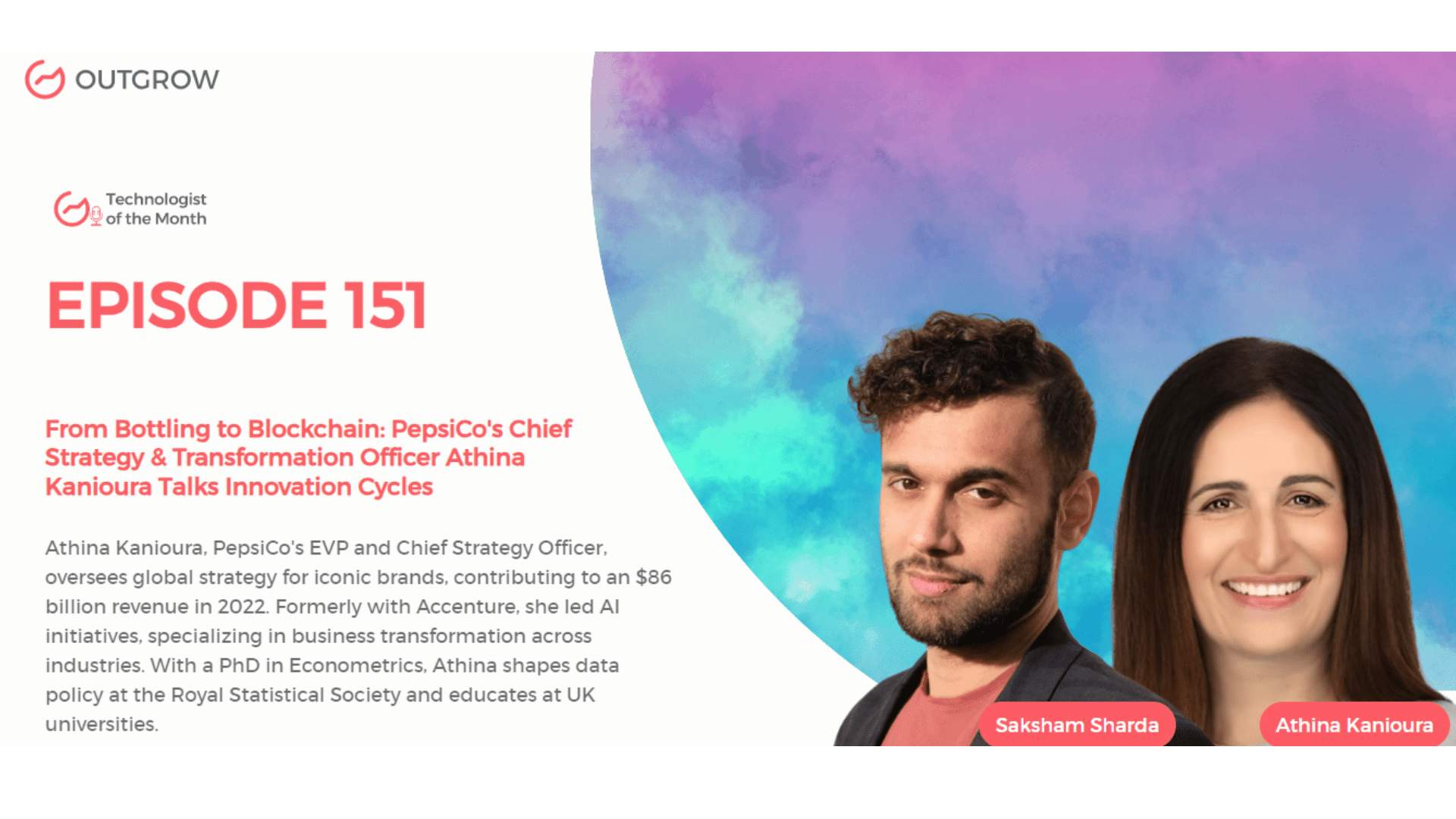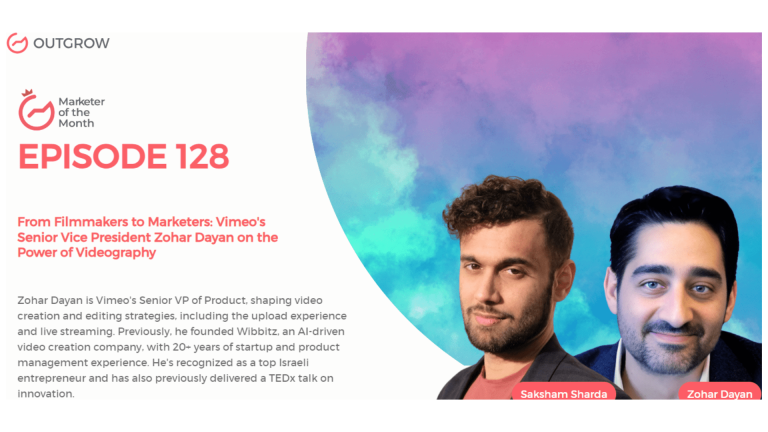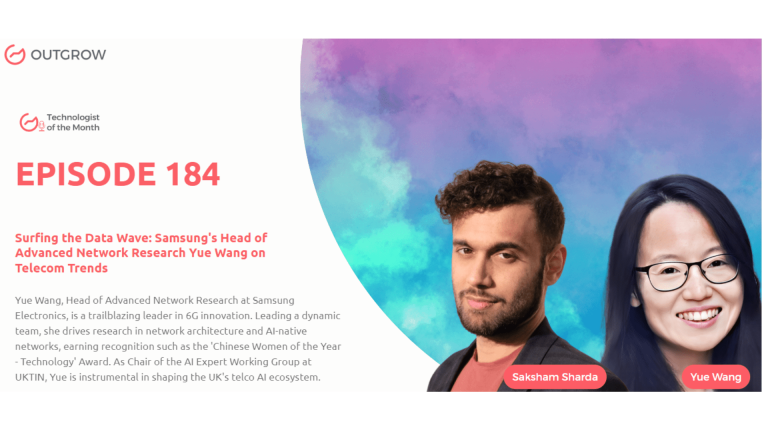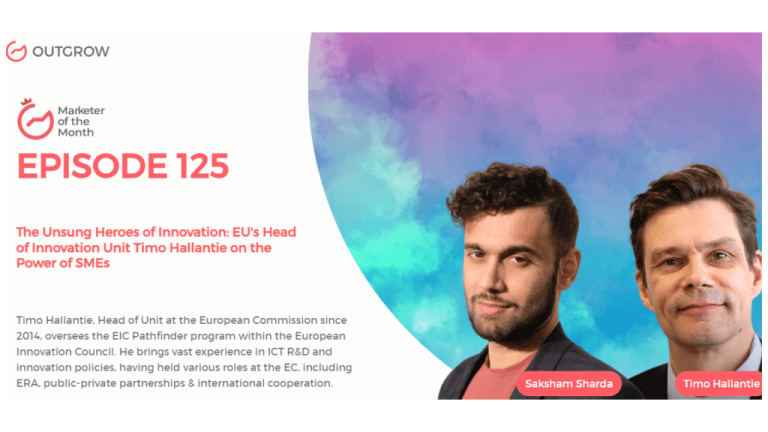EPISODE 151: Marketer of the Month Podcast with Athina Kanioura
Table of Contents
Hey there! Welcome to the Marketer Of The Month blog!
We recently interviewed Athina Kanioura for our monthly podcast – ‘Marketer of the Month’! We had some amazing insightful conversations with Athina and here’s what we discussed about-
1. Integrated Digital Transformation: Spanning the organization’s value chain.
2. Tech Application: AI, web3, robotics, blockchain in manufacturing, logistics, product development.
3. Streamlined Innovation: Focused on direct consumer engagement and mass personalization.
4. Theory-Practice Integration: Balancing academic rigor with real-time problem-solving.
5. Digital Hubs’ Functions: Co-creating AI solutions, fostering career growth, diverse tech skills.
6. Pepsi’s Tech Training: Digital Academy upskilling employees in varied roles.
About our host:
Dr. Saksham Sharda is the Chief Information Officer at Outgrow.co. He specializes in data collection, analysis, filtering, and transfer by means of widgets and applets. Interactive, cultural, and trending widgets designed by him have been featured on TrendHunter, Alibaba, ProductHunt, New York Marketing Association, FactoryBerlin, Digimarcon Silicon Valley, and at The European Affiliate Summit.
About our guest:
Athina Kanioura, PepsiCo’s EVP and Chief Strategy Officer, oversees global strategy for iconic brands, contributing to an $86 billion revenue in 2022. Formerly with Accenture, she led AI initiatives, specializing in business transformation across industries. With a PhD in Econometrics, Athina shapes data policy at the Royal Statistical Society and educates at UK universities.
From Bottling to Blockchain: PepsiCo’s Chief Strategy & Transformation Officer Athina Kanioura Talks Innovation Cycles
The Intro!
Saksham Sharda: Hi, everyone. Welcome to another episode of Outgrow’s Marketer of the Month. I’m your host, Dr. Saksham Sharda, and I’m the creative director at Outgrow. co. And for this month we are going to interview Athina Kanioura who is PepsiCo’s EVP and Chief Strategy Officer.
Athina Kanioura: Great to be here. Thank you.
Don’t have time to read? No problem, just watch the Podcast!
Or you can just listen to it on Spotify!
The Rapid Fire Round!
Saksham Sharda: The first question is at what age do you want to retire?
Athina Kanioura: 58.
Saksham Sharda: How long does it take you to get ready in the mornings?
Athina Kanioura: 15 minutes.
Saksham Sharda: Most embarrassing moment of your life?
Athina Kanioura: When my older son didn’t want to walk next to me.
Saksham Sharda: Favorite color.
Athina Kanioura: Blue.
Saksham Sharda: What time of day are you most inspired?
Athina Kanioura: Midnight.
Saksham Sharda: How many hours of sleep can you survive on?
Athina Kanioura: Oh three.
Saksham Sharda: Fill in the blank- An upcoming technology trend is ______.
Athina Kanioura: Quantum computing.
Saksham Sharda: The city in which the best kiss of your life happened.
Athina Kanioura: Athens.
Saksham Sharda: Pick one- Elon Musk or Mark Zuckerberg?
Athina Kanioura: Elon Musk.
Saksham Sharda: The biggest mistake of your career?
Athina Kanioura: Pass.
Saksham Sharda: How do you relax?
Athina Kanioura: I’m gonna give you the second-best answer, not the first one. It’s swimming.
Saksham Sharda: How many cups of coffee do you drink?
Athina Kanioura: Ten.
Saksham Sharda: A habit of yours that you hate?
Athina Kanioura: Overanalyzing.
Saksham Sharda: The most valuable skill you’ve learned in life.
Athina Kanioura: Listen.
Saksham Sharda: Your favorite Netflix show?
Athina Kanioura: Pass.
Saksham Sharda: One-word description of your leadership style.
Athina Kanioura: Assertive.
Saksham Sharda: Top priority of your daily schedule?
Athina Kanioura: Delivery.
Saksham Sharda: Ideal vacation spot for relaxation.
Athina Kanioura: Mocogno.
Saksham Sharda: Key factor for maintaining work-life balance?
Athina Kanioura: Exercise.
Saksham Sharda: The last song you’ve been listening to?
Athina Kanioura: Okay, darling stones.
Saksham Sharda: I am glad you are enjoying this interview. Alright, so the last movie that you saw had a good impression on you?
Athina Kanioura: The Marvels.
The Big Questions!
Saksham Sharda: Alright, so that was the end of the rapid-fire round.
Athina Kanioura: I couldn’t do more of that.
Saksham Sharda: Glad you like it. Now we can go on to the bigger questions which can take as much time as you need as much ease.
Saksham Sharda: Can you share more about your role as Chief Strategy and transformation officer at Pepsi and how you’re driving the company’s digitalization?
Athina Kanioura: Yes. So as part of my responsibilities, I have the accountability of driving the long-term and short-term strategy of the organization both around how we drive category penetration to our portfolio. And of course within that our sustainability agenda and more importantly in the end these aspects of the transformation. For us, this transformation is not a side initiative and that’s why we have embedded it within the strategy and transformation function. It is part of the core operations of the company to drive both operational and excellence, top-line performance, and bottom-line and also savings. So within the organization digital transformation is embedded in the end-to-end value chain.
Saksham Sharda: So could you give any interesting examples of how these initiatives are happening with the digital ones?
Athina Kanioura: Of course, many of them. So as I said, because we do it across the value chain everything from how we manufacture our products to how we move our products and then how we put them on the shelf for the consumers to buy is using technology AI, web3, robotics, blockchain to drive the performance. For example, if you go to our facilities, our plants we use extensively predictive asset maintenance for all the equipment for the plant performance, the packaging lines, and every asset management optimization that we have in the facilities on top of that we use AI for control tower so the plant manager will be able to observe practically if there’s likely to be an asset performance issue and therefore go and address it before the line stops working or there might be an accident. So we are also connected to health and safety. So that’s from the manufacturing side. If you were to think about the moving part of our business, our fleet specifically our drivers are using AI, for proactive route management, we link it with geolocation and tab analysis to be able to drive better performance driver performance, going to the store to be able to place the products, and of course, health and safety on the road and for the vehicles that they drive. And another good example is R&D are you aware of the perfect Cheetos,
Saksham Sharda: R&D, research and development.
Athina Kanioura: So we have used AI to clean to create what we call the perfect Cheetos. At PepsiCo, Cheetos is one of our biggest brands. So when it came to additional flavors, we wanted to reduce the time of formulation from six months to six weeks. So we use AI to be able to filter and test hundreds and 1000s of attributes. So with that, we created the perfect Cheeto both in terms of shape, linking with digital twin simulators, and flavor. So the new Flaming Hot Cheetos came out of the use of AI.
Saksham Sharda: And any other interesting products that are going to go from six months to six-week developments besides this one?
Athina Kanioura: not many. across everything that we do, we want number one to reduce the innovation cycle. So everything from how we think of the product to going through the innovation agenda and commercialization, we want to have a window that goes in weeks and not months and quarters. The second is direct to the consumer. So we have been working very actively with our consumers and we have billions of consumers across the world, what should be this portfolio of skills that they should have in their house be the delivery of four hours so they can enjoy the assortment full assortment that PepsiCo has to offer across beverages or breakfast portfolio or snacks portfolio, and better for your meals and snacks portfolios way. And then another area that we have been working very actively in the broader transformation agenda is the whole mass personalization by using a combination of web3, and AI to be able to create your personalized product. So not just in terms of the packaging, but also the flavor, so many more things to come in the market as we are now embedding technology in everything we do.
Saksham Sharda: And so how is Pepsi planning to stay ahead of AI advancements to align with long-term goals or something?
Athina Kanioura: So we have very strong internal teams that we have been building. For the past three years, we have hired more than 1000 people who have a specialization in both predictive AI and Gen AI, and then software engineering, but specifically on MLOps and AIOps. So we are enhancing and strengthening the internal talent. And second, we have a process around data ops, MLOps, and AIOps. So we can go from the pilot to the scale and the industrialization of the capabilities extremely fast and with a global rollout. And the third one, to be able also to do that responsibly, we have embedded the responsible AI framework within our responsible business framework. So everything we do has an auto process of how we track data, how we track the algorithms, and then how we roll them out responsibly, to ensure we are also very protective of the audience that we are targeting, whether it’s internal or external. And of course, we avoid any algorithmic bias that comes with that.
Saksham Sharda: So you have an academic background, how has that influenced your approach to this digital transformation?
Athina Kanioura: Hugely. Hugely for two reasons. One is we don’t cut corners in PepsiCo. Because with what you learn in academics, you have to drive precision. But what we want in PepsiCo is for you to want to drive precision and excellence in the context of the broader industry in which we are operating. So the rigor of how we build the capabilities, how we drive the AI adoption, and how we roll out the AI models comes from my academic background, and therefore we do everything ethically and responsibly. So that’s one aspect. And second, I believe in the ecosystem. Second, because of my academic background, you cannot solve all the problems on your own. So we have shaped a lot of partnerships with universities. So we have a partnership with the Stanford Institute of AI, with Wharton amongst other universities and of course with our customers such as Walmart that we partner in many things because we believe that it takes, you know, a village to be able to drive those capabilities and therefore the ecosystem that we bring together, it’s an ecosystem ready for success when it comes to the digital transformation.
Saksham Sharda: So then how do you bridge theoretical knowledge with practical applications ever since you joined this company?
Athina Kanioura: Of course in between academia, which I’m still dating, and PepsiCo, I have had the consulting experience where you could learn that you have to take the theory and apply it for real time problems. So one of the things that I have been doing and I haven’t guidance, many of my team members who have come from academia, long stint in academia is we don’t have unlimited research time in academia, you can write papers for years, and then you go to have your publications, here we have to work with specific timelines. So how are we able to dissect the work, so we will still kind of deliver product races for the company in a way that the business can digest it? So, unlike a guide, they may or may not have big banks. You know, progress is the king and the queen in this case. So what we’re trying to do is with short stints of delivery, we have scrum teams, led by trained professionals with Professional Scrum Master Certification, ensuring that we drive progress and adoption across the organization. And I would say the second thing is, at a demand, like what people believe is very expensive. So don’t boundaries have functions like we have in the industry? So we don’t necessarily think now, oh, I have to solve a supply chain problem. I have to solve a consumer problem. I have to hope to solve a commercial problem. Ultimately, I have to solve a problem that will unlock value for our consumers, which is cross-functional, showing that broad and horizontal integration of the capabilities that you always learn in academia is something that we are implementing in real life.
Saksham Sharda: So what impact do you foresee with Pepsi’s digital hubs? And how do they adapt to emerging tech trends?
Athina Kanioura: So far, the hubs have had a tremendous effect on our ability to deliver at scale those capabilities plus also to attract, I would say, the best talent in the market. And I’m going to Barcelona after Lisbon, where we have one of our biggest digital hubs, and we have more than 200 PhDs, AI experts across 150 nationalities, which is also important, the diversity that we have in those locations, has led to the acceleration of our journey, because it’s a location where the smartest minds are sitting together, they are brainstorming, they are developing solutions. They are experimenting and also driving as I was saying the rollout of those capabilities in the market. And so it was something that we were missing, because of course, we had very talented teams in the locations, but never in a very focused effort or locations where the talent from UI UX experts to product managers to data scientists to AI ops, they were co-creating together.
Saksham Sharda: So can you provide details on the functions of these digital hubs and the collaboration with existing teams?
Athina Kanioura: So as I was saying, in those digital hubs, you have everything from product digital product, folks, product success delivery, software engineers, service design process engineers, to data scientists, ML engineers, AI ops, and cloud infrastructure people and then the DevSecOps. So, everything that you would need to build a vertical ecosystem of acceleration on AI. So, this co-creation concept and collocation have been pivotal also for the career development of the individuals because the one thing we want to ensure is that those people are not just there to deliver the products but also to learn and upskill themselves throughout this process. So the cross-functional nature of the hubs has helped them professionally to understand what are the synergistic effects between a software engineer, a product engineer ML engineer, and a data engineer and therefore amplify the integration layer between those capabilities.
Saksham Sharda: Alright, so this is a different question. What does your daily routine at Pepsi look like? Give us an example of a day.
Athina Kanioura: Okay, so I wake up at six because the boys need to go to school, get them ready. And then I’m at the office by 7:30 or 7:45 am. Typically within the day, I have face-to-face meetings with the team so we’ve gone from you know, a hybrid model to three days at work which is great. So now the teams are in the office. So we’ll do face-to-face meetings. We look at the pipeline, we look at the products we brainstorm if something is going wrong and we make sure that we of course correct or brainstorm for new ideas. And then in between, we always have sessions and one-to-ones with our top talent. I always have in my day one-to-one discussions with what we call our high-potential people in the organization to ensure that we hear their points of view from everyone from the most junior to the most senior. And then I always leave like an hour to rate within my day. Before I go to ensure I catch up with what is happening externally, if there have been any papers or latest developments in the technology and how it would impact the programs, then I always have some time for our partners. As discussed, the ecosystem is important. Those partners could be the big technology partners, startups, or consulting partners that we work with because it’s important also to get their perspective throughout the evolution. And I typically leave the office around 6:30 to 7 pm.
Saksham Sharda: And what do you read about in that hour that you have? What publications?
Athina Kanioura: Yeah, I mean, everything from you know, the latest article in the Harvard Business Review to new books around you know, the evolution, the new races of ChatGPT and openAI. And to a lot of things, I will have to say a lot of my focus in the past month as well has been about AI regulation and workforce augmentation. As a company that has more than 300,000 employees, part of my remit is to ensure that as we roll out those capabilities, we don’t also compromise our commitments to our people around developing their talents, upscaling and rescaling and allowing them to still have a better job after we finish the journey. So
Saksham Sharda: What upskilling and reskilling programs are Pepsi deploying across the company?
Athina Kanioura: So we rolled out two years ago a program that we call the digital Academy. This is targeted only at employees, whether you are the plant manager, the driver, a warehouse delivery person, or someone who is a finance expert. And there you have majors and minors. So depending on your area of specialization, you have deep dives in specific technology topics that are relevant for your job. And then you need to have at least a foundational understanding of the basics of cloud, the basics of data foundation and data infrastructure, and the basics of AI, so end-to-end people can understand the implications of those technologies for the enterprise. We have now done the basic and foundational training for all the employees and we are going now through the majors for each of the groups. This year is the year of what we call frontline salespeople in our supply chain. People show we plan to train everyone in these specific areas of personal specialization. We are working very closely also with the government’s US government being one of those on how we can also influence the manufacturing Act and the upscaling and rescaling that is needed for this profile of employees.
Saksham Sharda: And so let’s talk a bit about technology and sustainability. So how does Pepsi leverage tech and sustainability? And what measurable impact has it had?
Athina Kanioura: Yeah, in several ways. And as you can imagine, I’ve worked very closely with our Chief Sustainability officers. And shaping the roadmap and then we are delivering number one, we have developed what we call a pep-positive cockpit. This is where we track all the KPIs around the major sustainability targets that we have for CO2 emission, what reduction, and climate impact biodiversity across the whole organization in every single market. This is also something that the executive team is using every month. It’s the one common way for us to ensure that we are on track with the internal and external commitments we have made. Second is scope one, scope two emissions are included in this analysis, and scope three which are not yet fully fledged. We have also started to build and assess, okay, from a regulatory perspective and ESG regulation. What else will we need to do to make sure that governments are also understanding how compliant we are with some of the commitments that are one area second big area is on agro? So we have been investing heavily in precision agriculture, and everything from how we do regenerative agriculture responsibly, measuring the humidity of the soil and making sure that we do it responsibly crop, understanding based on external weather conditions and phenomenon, what should be the yield cycles working with our farmers on what should be the potato season and that what should be the seed strategy that comes with that? All of that is empowered by technology. We have startups, but also internal IPs that we use across the board that track based on drones and external information along with essentials on the ground, or what should be the optimal strategy around regenerative agriculture. And, then another big area and I’m just giving you some examples, is also being able to track the negative impact of CO2 on data centers. As you know very well, sustainability so far has been the biggest focus on a piece of industrial equipment, on big manufacturing facilities, not so much on the impact of technology equipment on sustainability. This is why we want to be one of the first companies that track how much emissions come from our data centers or cloud consumption, and therefore, go back to our tech providers and make sure that we collectively both have commitments, around optimization and better use of these technologies.
Saksham Sharda: Is Pepsi planning to get to net zero at some point?
Athina Kanioura: Yes.
Saksham Sharda: So as a woman in tech, what advice do you have for aspiring female innovators?
Athina Kanioura: One is, don’t assume that people will give you a chance, because you’re a woman, you have to fight for it. And the environment is ripe, everyone now accepts and endorses women in tech. So it’s a great opportunity for the younger generation to get into this field. And whether they get into the field through entrepreneurial programmes, or big companies like us, and employers across the world, they want women in their tech workforce. So that’s number one. Point number two, unfortunately, with COVID, if you were to see the university admissions around the space and women in these STEM fields, they have been going down. So I think we have a responsibility. Women like me and many other women leaders in companies to revive the interest of female students in STEM specifically. And there is interoperability between STEM fields. In any case, I mean, you can have an engineering background or a computer science background, still, you can be a data scientist. So doing that, and making sure that we are committed. And what I’m doing is, I’m the sponsor of Million Women Mentors, and to ensure exactly that we drive this mentorship down to middle school and high school and across the world. And the last thing I would say is, it’s fine and It’s okay if you fail the first time you’re doing it, and no one will hold you accountable for failing once you’ve been failing twice as long as you are persistent, and then success will come.
Saksham Sharda: So the last question for you is of a personal kind. What would you be doing in your life if not this right now?
Athina Kanioura: Academia.
Let’s Conclude!
Saksham Sharda: Thanks, everyone for joining us for this month’s episode of Outgrow’s Marketer of the Month. That was Athina Kanioura who is PepsiCo’s EVP and Chief Strategy Officer.
Athina Kanioura: Pleasure. Thanks for having me.
Saksham Sharda: Check out the website for more details and we’ll see you once again next month with another marketer of the month.

Muskan is a Marketing Analyst at Outgrow. She is working on multiple areas of marketing. On her days off though, she loves exploring new cafes, drinking coffee, and catching up with friends.









